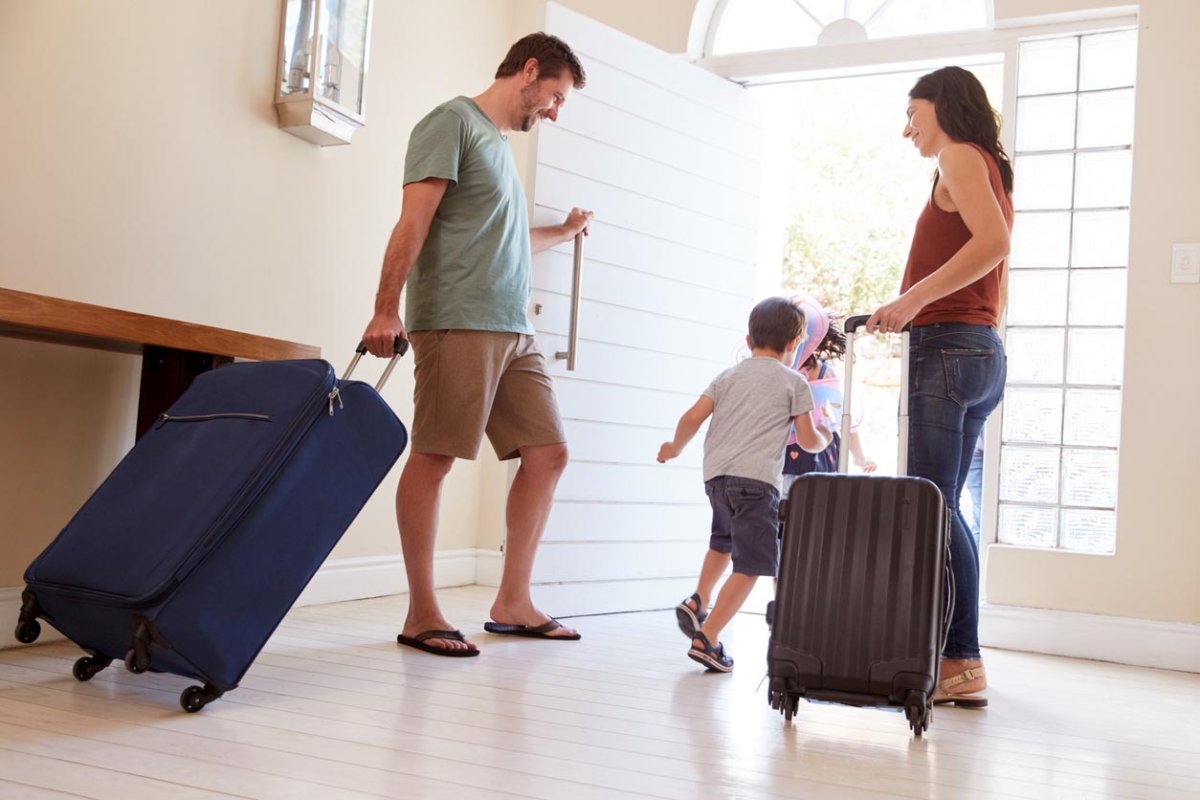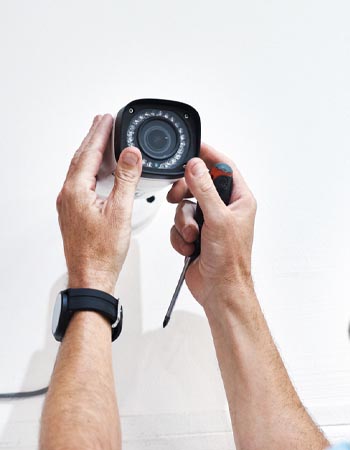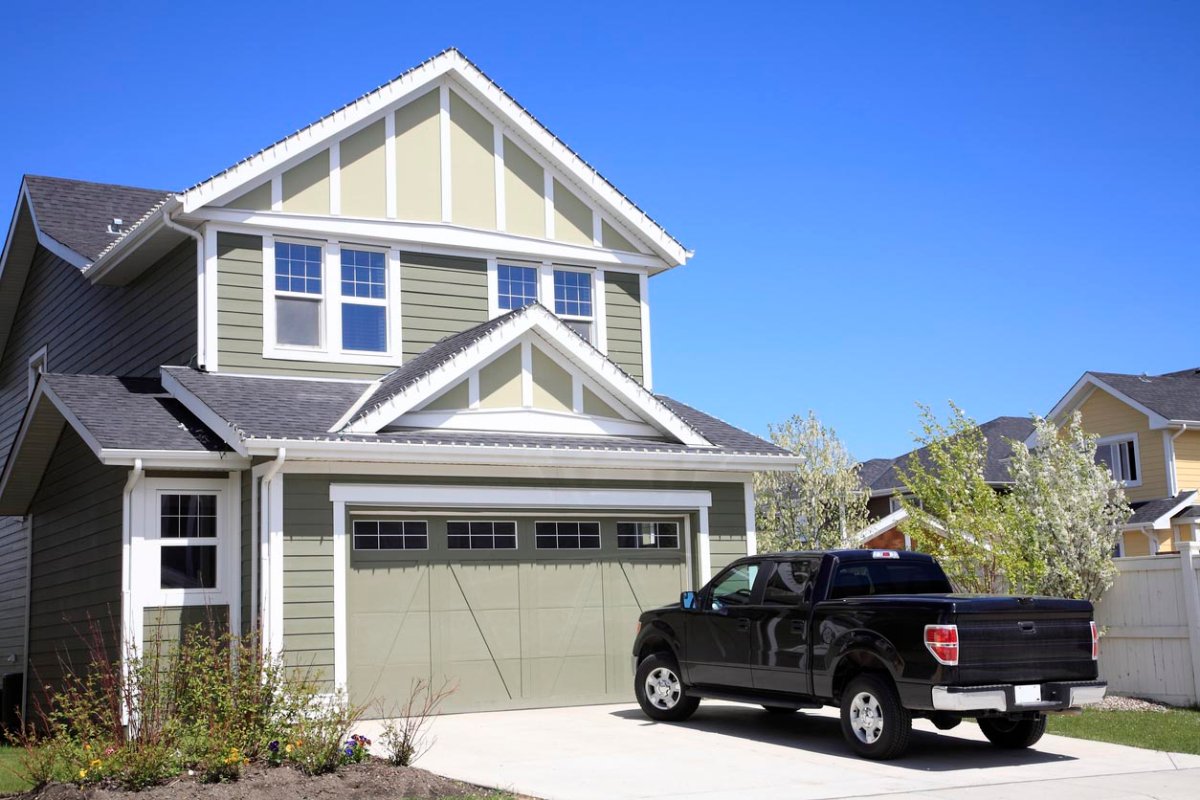

We may earn revenue from the products available on this page and participate in affiliate programs. Learn More ›
Going on vacation is always exciting. Whether you’re visiting family and friends or heading to a new destination, there’s nothing quite as thrilling as time away from home. However, it’s important to leave your house in good shape before heading out—and that means doing more than just locking the front door.
Empty homes are an easy target for burglars. If you’re going out of town for a long vacation (or even just a weekend), you’ll need to make sure your home is safe and secure. Otherwise, you could come back to disaster. Many folks understand how to have a safe vacation and safe travels home, but not everyone knows how to properly prepare their home for their extended absence.
Thankfully, learning how to protect a home while on vacation is simple and can be handled by tackling just a few extra steps before heading out on your trip. Along with installing a home security system, here’s a look at other vacation safety tips you can employ to secure your home while you’re away, including using smart bulbs, leaving a car in your driveway, and placing a hold on your mail.
1. Install a home security system.

Arguably the best thing homeowners can do to improve home protection before leaving on vacation is installing a home security system. These systems come in a variety of styles to suit a range of budgets. That means shoppers who don’t have time for a professional installation might be able to order a few gadgets for a DIY security system, giving them a fast and cheap way to keep tabs on the property while out at the beach or hiking in the mountains. Regardless of which option is chosen, a home security system is a worthwhile investment when it comes to keeping property safe and acting as a type of home protection insurance.
“Homes without alarm systems or dogs are attractive to burglars because the likelihood of being caught is severely reduced,” explains Gene Petrino, co-owner of Survival Response, LLC, a security consulting firm headquartered in Coral Springs, Florida. “Their goal is to break in, grab everything they can, and leave without being seen.”
The best home security systems (such as those from Vivint or ADT) use a combination of products to safeguard a property. Shoppers will typically see bundles that include various types of security cameras, motion detectors, entry sensors, and floodlights, providing them with a well-rounded kit that protects all entry points to the home. These products can almost always be monitored remotely, though customers who are serious about the safety of their home may want to opt for professional monitoring.
“Use advanced smart security systems, including two-way communication video, cameras, and motion-activated lights,” advises Petrino. “These devices not only alert you to the presence of an intruder on your property but also enable you to interact with the intruder in real time, potentially deterring them by making it clear that they are being monitored and recorded.”
When professional monitoring is enabled, it’ll send alerts to a dispatch company if any unusual activity is detected on the property. From there, dispatch can trigger sirens on the property or send authorities to investigate. In essence, the home security system serves as another set of eyes to watch over a property, which is a valuable thing when homeowners are away on vacation. This makes professional monitoring one of the most important home protection services homeowners can invest in.
Shoppers will want to keep in mind that home security costs vary widely based on the installed equipment and whether professional monitoring is included. Those who aren’t on a tight timeline will want to consider multiple options to find the best one for their budget. Homeowners and renters can take additional measures to safeguard their home before a vacation, such as mowing the lawn.
2. Use smart light bulbs and smart plugs to make it appear like the house is occupied.
A house that looks empty is a popular target for burglars. Because of this, families going on vacation would be wise to make it appear like their home is bustling with activity even when they’re gone. Smart light bulbs and smart plugs make this task easy, as they can be automated to activate and deactivate on a timer, giving the inside of a home an appearance of looking as busy as ever.
Smart lights are the simpler option of the two, as they replace traditional light bulbs without much hassle. After removing the old bulbs and screwing in the new smart bulbs, users can set up schedules for the bulbs to turn on and off. This lets them turn lights on and off at night, tricking would-be burglars into thinking someone is home. Some smart bulbs even come with a built-in “vacation mode,” allowing them to randomly toggle their power without the need to program any additional settings.
Residents may also want to consider using smart bulbs to leave their porch light on at night, as leaving it on for multiple days straight could signal to burglars that nobody is home. Families considering smart floodlights will also want to learn how motion sensor lights work prior to setting them up, as improper installation could annoy neighbors or leave the property vulnerable.
“Use motion sensor lighting by all points of entry and perimeter lighting around the property,” advises Petrino. He also recommends that homeowners “Use timers to…give the appearance someone is inside turning them on [and] off. Timers are particularly valuable when you are away on vacation.”
Smart plugs work much like smart bulbs, as they can be remotely controlled or placed on a setting to turn on and off throughout the day. Appliances and other electronics can then be connected to the smart plug. Homeowners may want to consider looking into smart plugs if they don’t want to change their existing bulbs. Smart plugs are also a good idea if other electronics need to be toggled on a schedule while residents are on vacation.

3. Park a car in your driveway so it looks like someone is home.
While this won’t be possible for everyone, parking a car in the driveway is a great way to keep strangers at bay. Homes that sit without a car in the driveway for multiple days in a row stand out like a sore thumb to criminals, giving them a clear indicator that nobody is home.
Residents who have more than one car will want to consider leaving one car in their driveway while they’re away on vacation. Of course, this may not be possible for those who don’t have a second car (or for those who live in a condo or townhome without a driveway), but residents of single-family homes can better safeguard their home by leaving a car visible to passersby.
Leaving a car in the driveway is typically a good idea, but there are cases where it might not be ideal. For one, luxury cars or expensive vehicles may be better off staying tucked in the garage, as intruders may see a luxury vehicle as a sign that the home has even more valuable items inside. It’s also important for residents to check crime reports to see if vehicle break-ins have been recently reported in the area. If they have, then leaving a car outside could result in a vehicle break-in, even if the home remains untouched.
In other words, it’s a good idea for residents to do a bit of research before leaving a vehicle in the driveway to ensure they’re doing enough to protect the house and the car.
4. Ask a trusted neighbor to keep an eye on your house while you’re away.
While nothing beats a good home security system, trustworthy neighbors are worth their weight in gold. Anyone on good terms with their neighbors will want to ask if they’re willing to keep an eye on the home while the homeowner is away on vacation, as a neighbor will often be the first to hear or see anything suspicious going on.
“Arrange for a friend, family member, or trusted neighbor to keep an eye on your home while you are away,” advises Petrino. Residents can also see if their neighbor would be willing to go inside their home while they’re away to check on things along with keeping tabs on the activity around the property. This serves two purposes. The first is simply checking to make sure a break-in hasn’t occurred. The second is so they can toggle lights or perform other tasks, such as checking water lines for leaks or resetting devices if the power goes out.
As a bonus third purpose, any burglars keeping tabs on the property will see that it’s being monitored, which would likely deter them from targeting the home.
5. Place a hold on your mail and newspaper deliveries, if applicable.
Nothing is more inviting to burglars than heaps of packages by the front door. Not only are these easy targets for the taking, but they usually indicate nobody is home, which could make the entire home a secondary target.
Thankfully, homes can easily request a hold on mail from the USPS, UPS, and FedEx. Most of these organizations can hold mail for up to 2 weeks, delivering the contents all at once when the residents return or holding them at a nearby branch for pickup.
Even if packages aren’t expected, it’s never a bad idea to issue a mail hold. This way, any unexpected deliveries that would otherwise be left at the door won’t be sitting there unattended while residents are away on vacation. If a package is delivered to the door, residents can ask a trusted neighbor to pick it up, as packages left outside for extended periods are vulnerable to thieves.
Beyond issuing holds with the major carriers, residents will want to pause subscription services and recurring delivery services. These services often use their own delivery companies and may not be covered by a mail hold issued to the USPS, UPS, or FedEx.
6. Make a plan to keep your yard maintained while you’re out of town.
While piles of packages are a dead giveaway that nobody is home, so too is an overgrown yard. And unless both the front and backyard are xeriscaped, vacationers will want to ensure that someone is maintaining their yard for the duration of the trip.
“Overgrown landscaping is great concealment for burglars,” says Petrino. “Again, their goal is to go undetected during their crime.”
As Petrino points out, any criminal who sees a dark house with an overgrown lawn immediately knows that it’s empty. That puts a big target on a home while its owners are on vacation, making it important to hire a professional landscaper while away or enlist the help of a neighbor. A maintained lawn helps prevent intruders, and if the property is part of a homeowners association (HOA), it could help keep the home from violating any regulations about landscaping and overgrowth.
Alternatively, residents can look into investing in one of the best robot lawn mowers. These nifty devices aren’t cheap, but they’re essentially a robot vacuum for grass. After they’re set up and on a schedule, they’ll automatically cut grass to a preset height, allowing residents to head out on vacation without having to deal with out-of-control grass when they return.

7. Keep your vacation plans off social media.
In today’s always-online world, it’s easy to overshare. And while posting photos of your lunch might result in only some envious “likes” from your followers, posting about vacation plans could lead to serious safety concerns.
Even if a social media profile is locked down and set to private, it’s unlikely that every single follower viewing a profile can be trusted. It’s also impossible for the account owner to tell who their followers are sharing their posts with. If the details about a vacation fall into the wrong hands, it could make the empty house a target.
Beyond avoiding sharing details of the vacation in advance, it’s important for social media users to refrain from posting images of the trip until they’re back home. People viewing the profile in real time could see images taken in a place far from home, letting them know about the vacation without the person posting it explicitly saying anything. To be safe, it’s best to simply stay off social media while vacationing.
8. Stow your valuables out of sight.
Before heading out of town, it’s important for residents to close blinds and curtains to limit the view inside a home. If blinds are left open, burglars can easily scope out the property without much trouble. Because of this, residents will want to ensure that blinds are closed and also that any valuables that are usually out in the open are tucked out of sight.
For example, if there is any jewelry in the bedroom or bathroom that could be seen by someone peering through a window, it’s best moved to a closet or other hidden location. The same goes for expensive computers, video game systems, electronics, or rare collectibles. Residents will want to do a quick sweep of the house before heading out, paying close attention to their most prized possessions and moving them to secure areas of the home if necessary. It’s also not a bad idea for them to look at the best home safes (such as the SentrySafe Waterproof and Fireproof Safe Box), as they offer a simple way to lock up valuables.
Along with stowing valuables inside the home, it’s important for residents to pay attention to valuables that might be vulnerable outside the home. This could include expensive patio furniture, lawn ornaments, or children’s toys. Residents will want to consider locking these away in a shed or placing them in the garage, if space permits.
9. Don’t forget to lock your doors and windows before you leave.
It should go without saying, but it’s remarkably important and worth reiterating—residents will want to remember to lock all the doors and windows when going on vacation. Crimes of opportunity happen all the time, and if criminals have easy access to a home via an unlocked door or window, there’s little stopping them from making their way inside.
Smart locks can help with this, as they offer features such as auto-lock or the option to remotely lock or unlock the door. Many of the best smart locks can even track the door’s activity. For example, the Yale Assure Lock 2 provides a running feed of when it was last opened, closed, locked, and unlocked. Front-door security is important for an empty home, and residents will want to pay close attention to it before leaving on vacation. There are many types of door locks on the market, but few are as functional as smart locks.
There’s not a similar product for windows, but entry sensors are a good backup option. These will trigger an alarm when the window is opened, so even if they’re left unlocked, there’s still a second layer of home systems protection to fall back on. Window glass-break sensors are another solid choice, though shoppers will want to understand how glass-break sensors work before installation, as there are important details that could impact their usefulness.
Going on vacation is exciting, but between all the packing and planning, it’s easy to forget to take care of the home before hitting the road. However, protecting your home while on vacation isn’t too difficult. By following the house security tips laid out above, you can help keep your home safe while you’re away on vacation. At a minimum, make sure to lock your doors, stay off social media, and place a hold on mail. Those who want to shore up their home security before a vacation will want to consider installing a security system, asking a neighbor to keep an eye on the home, and using smart bulbs to simulate activity. When these measures are put in place, burglars are likely to stay far away.
